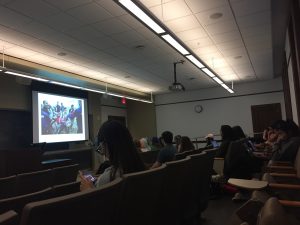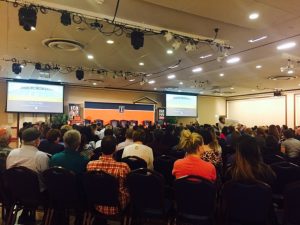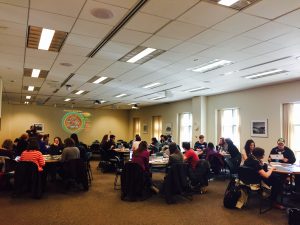“Tools change. Audiences change. The work doesn’t.” This quotation is a subhead in chapter 3 of “Principles of American Journalism.” With the advancement of technology, today’s journalist has more tools than ever before. However, Digital tools don’t replace the values of journalism. Even reporters who started in one medium can take core values to a new medium. From newspaper only to online platforms, news gets disposed faster. It’s easy to lost in the cyberspace. But as journalists, we must make sense of the sea of modern information, not be washed away by it. Regardless of the medium, responsible journalists always aim to gather and report truthful information.
The Power of Pen
News has been evolved over generations, with the popularity of social media. Though the forms of news gets spread become more diverse, its function and purpose has not changed. Journalism serves as the mirror, the watchdog and the marketplace. To fulfill its function, journalists sometimes have to risk their lives to report truth for the citizens. For example, the newspaper Sunday Leader had exposed government corruption for years, and at the end of the day, its editor Lasantha Wickramatunga was gunned.
Utilizing the right of free expression, as a journalist I should observe, verify and report truth. At the age of twelve, I published an article in Qianjiang newspaper about the endless homework assigned during my childhood, and received many letters of support. This article made the public reexamine and criticize China’s test-oriented education system. That was the first time I realized the importance of publishing articles that reflect society’s problems. I was able to see proof that a young girl could attract the public’s attention through the power of the pen. To become a professional journalist is the way I chose. I hope to enhance public awareness using the power of the pen, leading promotion in social equality.
Uploading Grades Should Have A Deadline
On April 26, The Daily Illini Editorial Board wrote an article under the opinion column to urge professors to upload student’s grade in a reasonable amount of time.
It’s near the end of the semester – students are trying every possible way to boost their grade. For some classes, students don’t have any grade posted throughout the semester, so they don’t have a tangible idea how they are doing in that particular class.
Students rely on the grades and feedback from previous assignments to make improvements in later assignment. Receiving a grade serves as an incentive for the students: A good grade rewards student’s input; a not-so-good grade motivates students to devote more efforts.Without professor’s reviewing, students would stumble over the same mistakes over and over.
We student make efforts to hand in assignments within deadlines set by professors; in returns, professors should also give feedback in a specific time frame.
To achieve academic success, both students and professors should so their corresponding parts to maintain a pleasant and rewarding relationship.
Sources: “Editorial: Students have a right to know their grades before finals”
http://dailyillini.com/opinions/2017/04/26/editorial-students-right-know-grades-finals/
UMR Presents Syria & The Media
On Tuesday, April 25th, the United Minority Relief held a talk on the relationship between photojournalism and the Syrian Crisis. Professor Finnegan discussed how the media portrays the Syrian refugees for raising awareness or collecting donations. On several website for donation, organizations like to use demand photos, which is usually a child who looks right in to your eyes. The reason that children’s image is often used is people tend to think they are the innocent victims from the politics.

A Conversation With Senior Leadership
On April 19, Chancellor Robert J. Jones hosted a public discussion with students and parents in the Illini Union rooms A, B, and C. The event included “a brief budget update, a campus issues roundtable, and a Q&A with the audience”.

Twitter Sues the Government for an Anonymity
On April 6, The New York Times reported that Twitter sued the federal government for blocking an anonymous account.
Twitter refused the summons directing it to reveal the identity behind @ALT_USCIS, which has claimed to have ties to a government agency.
The @ALT_USCIS account has frequently posted messages criticizing the Trump administration’s immigration policies and enforcement actions.
Twitter said it would not disclose the identity behind the account, even under the government’s pressure. The company argued that the government has no strong justification, and this request violates people’s right of free speech.
“A time-honored tradition of pseudonymous free speech on matters of public moment runs deep in the political life of America,” Twitter said in its filing. “These First Amendment interests are at their zenith when, as here, the speech at issue touches on matters of public political life.”
What Twitter did protected its users’ First Amendment rights, which is similar to the Shield Laws which protects interviewee who wants to be anonymous. We live in a country free of expressions and revelations, even under the pressure of governments and politicians.
Tainted Medicine Caused Deadly Infections
On March 22, 2017, ABC News reported the deadly meningitis trail, which the ex-pharmacy head was accused for producing contaminated medicine that caused death.
The investigators found unsanitary conditions with “filth, rusted equipment and insects” at the Boston-based New England Compounding Center, where contaminated medicines were produced.
The source incorporates government data that shows a total of 753 people across the country were stricken with an epidemic of infections, and 64 of them died, after receiving contaminated injections produced by Cadden’s company.

Creating public health crisis, Barry Cadden, the former president and co-founder of the NECC, was convicted of fraud, not guilty of murder.
Such investigative piece served as a watchdog in public health, which exposed the unsanitary conditions in pharmacy that doomed hundreds of people.
21st Century Scientests Workshop
On Friday, April 7th, The Beckman Institute held the third annual 21st century scientists workshop. This full day event is dissect into many portions. From 10:30 to 12 p.m., Dr. Joycelyn Landrum-Brown gave a workshop entitled “Building bridges and intergroup understanding”.

For more information, please visit http://21centurysci.com/workshop
Diversity Fest
On Sunday, April 9th, “Hear My Voice: Diversity Festival” was held in the Courtyard Cafe. The event was intended to know your peers from different backgrounds with various forms of expression.

Fake News Workshop
On Feb. 1, Dr. Nicole A. Cooke, Dr. Stephanie Craft, Dr. Barbara M. Jones, and Dr. Rachel M. Magee gave presentations at LIS on the topic of fake news. The lecture focused on “defining fake news and discussing how it relates to literacy and information behavior.”

The presentations started up talking about social media and social network sites, which can be referred to as SNS. There are various types of social media engagement, or “genre”. The speaker stressed on we should not pay attention to individuals but to the technology.
The speaker mentioned that we are in the age of post truth: people tend to believe truth that has emotional appeals, but not necessarily true. Moreover, audience are in the “filter bubble”, which means they are looking for information that corresponds with their inner believe. For example, people intend to take the top hits on Google when researching, or clicking on titles that reassure their previous assumptions.
Fake news can be sorted into two categories: misinformation and disinformation. Misinformation is info that is wrong but rapidly spread, but is not be done intentionally; while disinformation is purposely put out fake news to earn the blogger money. From the psych point, sharing fake twitter post could satisfy people’s need to be liked.
The speaker gave several guidelines on how to move past fake news, which includes triangulate,check your own biases, read outside your bubble, know the difference between satire, propaganda, infotainment. And when clicking on the headline, check the source, and ask yourself, what’s their angle? Is there an “about” page? Is the language inflammatory? Is the site overrun with ads?
The speaker emphasized we should care about the news and be news watchdogs because democracy won’t work without news.
The session ended with hands-on exercises with audiences for addressing fake news.
Sources:
https://ischool.illinois.edu/events/2017/02/01/fake-news-workshop

